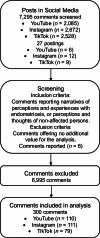Endometriosis- "Either way a tragedy"? A qualitative social media analysis of endometriosis perceptions in Germany
- PMID: 40615852
- PMCID: PMC12226911
- DOI: 10.1186/s12905-025-03865-2
Endometriosis- "Either way a tragedy"? A qualitative social media analysis of endometriosis perceptions in Germany
Abstract
Background: Endometriosis is one of the most common diseases in women of reproductive age. Those affected suffer from a variety of symptoms that can have a challenging impact on different areas of life. Social media such as Instagram, TikTok and YouTube offer affected women a platform for sharing their condition and increasing its visibility. This study examines how endometriosis is communicated in the comment sections of such posts on social media in Germany in order to better understand the reality of the lives of those affected.
Methods: 300 comments from Instagram, TikTok and YouTube were evaluated using summarizing qualitative content analysis. Data collection took place between October and November 2024.
Results: Four categories were identified that shaped the exchange on social media. These included psychological and physical stress, criticism of healthcare, social impact and coping with endometriosis.
Conclusions: Endometriosis remains stigmatised as a "women's disease", which makes recognition and prioritization in the healthcare system difficult. The reduction to menstruation-related complaints hinders the treatment of endometriosis-related symptoms, while pejorative communication by doctors increases the burden on those affected. While social media enables open dialogue and peer support, it also has potential to spread misinformation, influencing health decisions and fostering scepticism toward medical advice. Addressing these challenges requires a multifaceted public health response: destigmatising endometriosis through education, improving medical training, strengthening diagnostic pathways, and raising awareness in society.
Keywords: Barriers; Communication; Content analysis; Endometriosis; Social media; Stigmatisation.
© 2025. The Author(s).
Conflict of interest statement
Declarations. Ethics approval and consent to participate: For this study, data were collected from social media platforms. Since these are publicly accessible forums, users’ posts were treated as publicly available secondary data, in accordance to recommendations in the field [18]. As detailed in the methods section, multiple measures were taken to ensure data anonymity. This approach aligns with recommendations for secondary data analysis [36]. This procedure was approved by the independent ethics committee of Witten/Herdecke University (IFFV 2024-81). Consent for publication: Not applicable. Competing interests: The authors declare no competing interests.
Figures
Similar articles
-
Parents' and informal caregivers' views and experiences of communication about routine childhood vaccination: a synthesis of qualitative evidence.Cochrane Database Syst Rev. 2017 Feb 7;2(2):CD011787. doi: 10.1002/14651858.CD011787.pub2. Cochrane Database Syst Rev. 2017. PMID: 28169420 Free PMC article.
-
How lived experiences of illness trajectories, burdens of treatment, and social inequalities shape service user and caregiver participation in health and social care: a theory-informed qualitative evidence synthesis.Health Soc Care Deliv Res. 2025 Jun;13(24):1-120. doi: 10.3310/HGTQ8159. Health Soc Care Deliv Res. 2025. PMID: 40548558
-
Survivor, family and professional experiences of psychosocial interventions for sexual abuse and violence: a qualitative evidence synthesis.Cochrane Database Syst Rev. 2022 Oct 4;10(10):CD013648. doi: 10.1002/14651858.CD013648.pub2. Cochrane Database Syst Rev. 2022. PMID: 36194890 Free PMC article.
-
Health professionals' experience of teamwork education in acute hospital settings: a systematic review of qualitative literature.JBI Database System Rev Implement Rep. 2016 Apr;14(4):96-137. doi: 10.11124/JBISRIR-2016-1843. JBI Database System Rev Implement Rep. 2016. PMID: 27532314
-
Factors that influence the provision of intrapartum and postnatal care by skilled birth attendants in low- and middle-income countries: a qualitative evidence synthesis.Cochrane Database Syst Rev. 2017 Nov 17;11(11):CD011558. doi: 10.1002/14651858.CD011558.pub2. Cochrane Database Syst Rev. 2017. PMID: 29148566 Free PMC article.
References
-
- Hudelist G, Fritzer N, Thomas A, Niehues C, Oppelt P, Haas D, et al. Diagnostic delay for endometriosis in Austria and germany: causes and possible consequences. Hum Reprod. 2012;27:3412–6. - PubMed
-
- Davenport S, Smith D, Green DJ. Barriers to a timely diagnosis of endometriosis: A qualitative systematic review. Obstet Gynecol. 2023;142:571. - PubMed
MeSH terms
LinkOut - more resources
Full Text Sources
Medical


